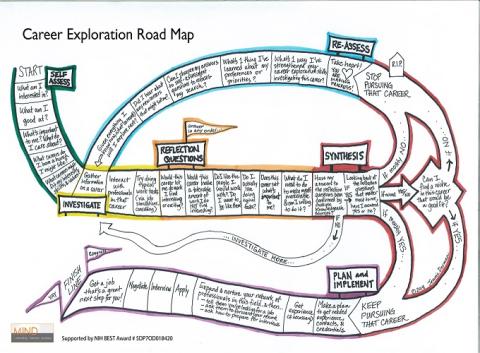Many PhDs are considering next career steps after the completion of their degree. A big question on many minds is, “Should I do a postdoc or not?” Stephanie Eberle addresses this question in an article on Inside Higher Ed, “Do You Need a Postdoc?”


The career exploration road map is a tool that was developed by Bill Lindstaedt and Jennie Dorman to help students/trainees visualize the career exploration process and track their progress. This tool was initially developed for graduate students and postdocs at the University of California, San Francisco, but is now available for all to use.
Congratulations! You succeeded in landing your first position in industry after NIH and, like most trainees, you are experiencing a mix of emotions in anticipation getting started.

Word Cloud Created by Jodian Brown using the generator found at https://www.jasondavies.com/wordcloud/ Written by Jodian Brown, Ph.D., Computational Chemistry, IRTA Postdoctoral Fellow OD/OIR/OITE, National Institutes of Health Data science – it is a field of study that has exploded over the past few years. Consequently, there is a lot of interest from our trainees.
Post Doc Alumna: Anu Nagarajan, PhD
Industry Position: Senior Scientist
The OITE interviewed a NIH postdoctoral alumna who successfully landed a position in industry. She shares her career exploration process, job search strategies, and knowledge that she gained about her employability as a professional scientist.
OITE: Tell me the story about how you began to search for career options as post doc.
On May 11, 2017 the OITE will again host the NIH Career Symposium! This year is special…we will celebrate its 10th anniversary. This event is one of our favorites, it highlights the multitude of career opportunities for biomedical scientists—and in the past decade over 7500 graduate students, postdocs and fellows have attended the event to propel their own careers. Our invited speakers tell us about their career paths, how they got their jobs, and advice to attendees as they plan their careers.
For many NIH PhDs and post-docs in the sciences, the formula that you learned to use to find a successful academic career has been straight -forward:
Graduate Degrees + Research +Publications + Academic Job Talks + Academic Achievements (BS through PhD) = Successful Careers
You may not know that after the Post-Doc, there are some additional skills that can be added to the job search equation. Here they are:
Behavior based interviewing is an effective tool used by many science industry recruiters and graduate/professional school admissions officers. They differ from technical or scientific interviews because they are designed to give a glimpse into how you will perform in the future on “soft skills” by having you reflect and talk aloud about behaviors that you have done in the past.
In the OITE we are often asked about the career paths of former postdocs. While we do not conduct mandatory exit surveys, we do have some data from the OITE NIH Alumni Database. This database is populated as fellows leave the NIH. To date it contains about 1100 entries. Of those, 639 contain career information that we have been able to analyze. Caveat: this information is only from former trainees who have voluntarily created entries in the database; it does not capture the full range nor percentage of actual career paths*.
One of the most important criteria to consider during the job, graduate school, or Postdoc search is to learn about the culture of the place where you are applying. This means to gather information about the employee’s opinions of the work environment, the support and benefits that they receive, and the values that drive the organization. This is important because you will work and /or study in this environment for many years and you want to find a good fit for your interests and personal style. But how do you assess this when you are applying?

